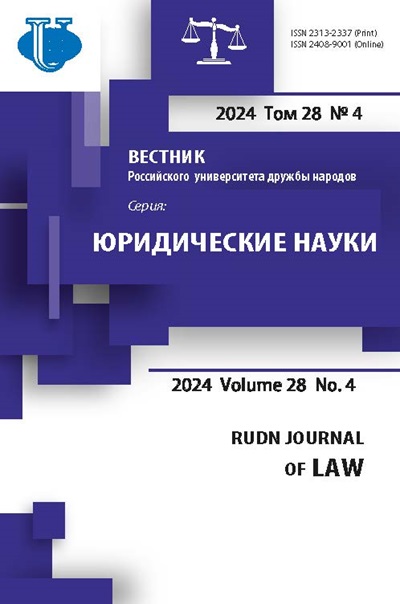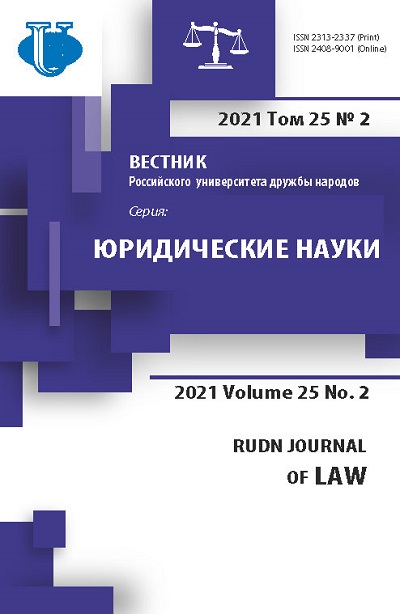Application of digital technologies in litigation and dispute resolution
- Authors: Dobryakov D.A.1, Kasa I.1, Sukhostavskaya Y.V.1
-
Affiliations:
- Peoples' Friendship University of Russia (RUDN University)
- Issue: Vol 25, No 2 (2021)
- Pages: 461-481
- Section: PROCEDURAL LAW. PROSECUTOR SUPERVISION
- URL: https://journals.rudn.ru/law/article/view/26709
- DOI: https://doi.org/10.22363/2313-2337-2021-25-2-461-481
Cite item
Full Text
Abstract
By now (we mean 2020) “digitalization” has completely replaced the more general “modernization” and “innovation” from both the political vocabulary and the sci-entific agenda. It is difficult to say how long this trend will continue and what kind of socio-technological phenomenon will replace it. It can be “cyberization”, within which a person will begin to bring himself into line with the canons of the sci-fi cyberpunk’s and combine biological with technological (and digital at the same time) in his body, or vice versa, some kind of reactionary “naturalization”. Anyway, now the widespread adoption of digital technology is an indisputable and obvious fact. And this process applies to all spheres of society’s life, without bypassing legal proceedings and out-of-court settlement of disputes (or in other words - alternative dispute resolution), which can be significantly improved using digital technologies. This article analyses the practice and legislative regulation of the use of digital technologies in various forms of legal proceedings and such types of out-of-court dispute resolution as arbitration and mediation. Comparative legal method allowed to compare Russian and foreign legislations as well as approaches to determining the permissible limits of the use of digital technologies, including their “intellectual” variety. Individual proposals have been formulated to improve Russian legislation.
About the authors
Denis A. Dobryakov
Peoples' Friendship University of Russia (RUDN University)
Author for correspondence.
Email: den-dobryakov@yandex.ru
ORCID iD: 0000-0002-2384-8659
Candidate of Legal Sciences (PhD), senior lecturer of Department of Judicial Power, Law-Enforcement and Human Rights Activities, Law Institute
6 Miklukho-Maklaya str., Moscow, 117198, Russia FederationIlda Kasa
Peoples' Friendship University of Russia (RUDN University)
Email: kasaildar@gmail.com
ORCID iD: 0000-0003-3805-7371
Candidate of Legal Sciences (PhD), senior lecturer of the Department of Judicial Power, Law-Enforcement and Human Rights Activities, Law Institute
6 Miklukho-Maklaya str., Moscow, 117198, Russia FederationYuliia V. Sukhostavskaya
Peoples' Friendship University of Russia (RUDN University)
Email: kloffka@mail.ru
ORCID iD: 0000-0002-2398-7712
senior lecturer of the Department of Judicial Power, Law-Enforcement and Human Rights Activities, Law Institute
6 Miklukho-Maklaya str., Moscow, 117198, Russia FederationReferences
- Alexandrov, A.S. (2018) Russian Criminal Procedure Dogmatism or the Digital World: What Will Win? The Legal Truth in Criminal Law and Process. Saint Petersburg, Petropolis Publ. pp. 24-34. (in Russian).
- Alexandrov, A.S. (2018) The Problems of the Theory of Criminal Procedural Proof, Which Must Be Solved in Connection With the Transition to the Digital Age. Judicial Authority and Criminal Procedure. (2), 130-139. (in Russian).
- Aletras, N., Tsarapatsanis, D., Preoţiuc-Pietro, D. & Lampos, V. (2016) Predicting judicial decisions of the European Court of Human Rights: a Natural Language Processing perspective. PeerJ Computer Science 2:e93. Available at: https://doi.org/10.7717/peerj-cs.93 [Accessed 20th May 2020].
- Alikperov, Kh.D. (2019) Computer program for determining punishment. Baku, 47-49. (in Russian).
- Baranov, A.M. (2019) Electronic Evidence: Illusion of the Criminal Process of the 21st Century. Russian Journal of Criminal Law. 13, 64-69. (in Russian).
- Danziger, Sh., Levav. J. & Avnaim-Pesso, L. (2011) Extraneous factors in judicial decisions. PNAS. 108 (17), 6889-6892. Available at: http://www.pnas.org/content/108/17/6889 [Accessed 20th May 2020].
- Friedland, P. (2018) 2018 International Arbitration Survey: The Evolution of International. Arbitration. 2-3. Available at: https://www.whitecase.com/sites/whitecase/files/files/download/publications/qmul-international-arbitration-survey-2018-19.pdf [Accessed 20th April 2020].
- Golik, Yu.V. (2019) Search of Measure. Criminology: Yesterday, Today, Tomorrow. 1 (52), 23-25. (in Russian).
- Himikus, E.I. (2016) Selected issues of legal regulation of online mediation. Modern law. (2), 102-104. (in Russian).
- Kasa, I. (2019) Legal regulation of the activities of the arbitration tribunal in the Russian Federation and in the Swiss Confederation: comparative legal study. Diss. ... cand. legal of sciences. Moscow, RUDN University. (in Russian).
- Kasa, I. (2018) Novella in the formation of the arbitration tribunal: can a robot replace a human arbiter? Eurasian Advocacy journal. 2 (33), 77-81. (in Russian).
- Korobeyev, A.I. (2019) Expert opinion on the electronic system for determining the optimal measure of punishment presented by a doctor of legal sciences, Professor Kh.D. Alikperov. Baku, 71-73. (in Russian).
- Khraputsky, A. & Silchenko, V. (2019) The possibility of using online Arbitration (for example, in some countries of the post-Soviet space). Arbitration.ru. 10 (14), 32-38. (in Russian).
- Mitchell, M. (2019) Artificial Intelligence: A Guide for Thinking Humans. New York, Farrar, Straus and Giroux. Available at: https://books.google.ru/books?id=65iEDwAAQBAJ&printsec=frontcover&hl=ru#v=onepage&q&f=false [Accessed 20th April 2020].
- Pastukhov, P.S. (2015) Electronic Evidence in Criminal Proceedings. Tomsk State University Journal. (396), 149-153. (in Russian).
- Scherer, M. (2019) International Arbitration 3.0 - How Artificial Intelligence Will Change Dispute Resolution. Austrian Yearbook on International Arbitration 2019. pp. 503-514. Available at: https://ssrn.com/abstract=3377234 [Accessed 20th May 2020].
- Tegmark, M. (2017) Life 3.0: Being Human in the Age of Artificial Intelligence. New York: Penguin Random House, 39. Available at: https://books.google.ru/books?id=3_otDwAAQBAJ&printsec=frontcover&hl=ru#v=onepage&q&f=false [Accessed 20th April 2020].
- Thompson, D. (2015) Creating New Pathways to Justice Using Simple Artificial Intelligence and Online Dispute Resolution. International Journal of Online Dispute Resolution. 1 (2). Available at: http://digitalcommons.osgoode.yorku.ca/olsrps/152 [Accessed 20th April 2020].
- Qin, Zh. (2019) The Use of New Technologies in International Arbitration. The American Review of International Arbitration. Available at: http://aria.law.columbia.edu/the-use-of-new-technologies-in-international-arbitration/ [Accessed 20th April 2020].
- Zuev, S.V. (2018) Electronic Criminal Case: For and Against. Law and order: history, theory, practice. 4 (19), 6-12. (in Russian).
- Voronin, M.I. (2019) Electronic Evidence in the Criminal Procedure Code: to Be or not to Be? Lex Russica. 7 (152), 74-84. (in Russian).
- Valeev, D.Kh. & Nuriev A.G. (2019) Electronic Document Flow in the Field of Justice in the Digital Economy. Perm University Herald. Juridical Sciences. (45), 467-489. (in Russian).
- Vlasova, S.V. (2018) Toward adjusting the criminal procedural mechanism to digital reality. Criminalist Library. Scientific Journal. (1). Available at: https://www.iuaj.net/node/2433 [Accessed 20th April 2020]. (in Russian).
- Voskobitova, L.A. (2019) Criminal Justice and Digital Technology: Compatibility Issue. Lex Russica. 5 (150), 91-104. (in Russian).
















